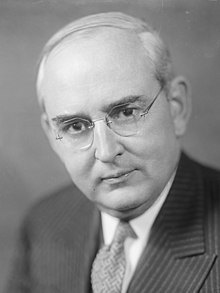
Back ارثر هيندريك ڤاندينبيرج ARZ آرتور اچ. وندنبرق AZB Arthur H. Vandenberg German Arthur Vandenberg Spanish آرتور اچ. وندنبرگ Persian Arthur Vandenberg French Arthur H. Vandenberg Hungarian Arthur Vandenberg ID アーサー・ヴァンデンバーグ Japanese Arthur H. Vandenberg NB
Arthur Vandenberg | |
|---|---|
 Vandenberg, c. 1905–1945 | |
| President pro tempore of the United States Senate | |
| In office January 3, 1947 – January 3, 1949 | |
| Preceded by | Kenneth McKellar |
| Succeeded by | Kenneth McKellar |
| Chairman of the Senate Committee on Foreign Relations | |
| In office January 3, 1947 – January 3, 1949 | |
| Preceded by | Tom Connally |
| Succeeded by | Tom Connally |
| Chairman of the Senate Republican Conference | |
| In office January 3, 1945 – January 3, 1947 | |
| Leader | Wallace H. White Jr. |
| Vice Chair | Harold Hitz Burton John Chandler Gurney Milton Young |
| Preceded by | Charles L. McNary |
| Succeeded by | Eugene D. Millikin |
| United States Senator from Michigan | |
| In office March 31, 1928 – April 18, 1951 | |
| Preceded by | Woodbridge N. Ferris |
| Succeeded by | Blair Moody |
| Personal details | |
| Born | Arthur Hendrick Vandenberg March 22, 1884 Grand Rapids, Michigan, U.S. |
| Died | April 18, 1951 (aged 67) Grand Rapids, Michigan, U.S. |
| Resting place | Oak Hill Cemetery, Grand Rapids, Michigan |
| Political party | Republican |
| Spouses | Elizabeth Watson
(m. 1906; died 1917)Hazel Harper Whitaker
(m. 1918; died 1950) |
| Children | 3, including Arthur Jr. |
| Alma mater | University of Michigan Law School (attended) |
| Profession |
|
Arthur Hendrick Vandenberg Sr. (March 22, 1884 – April 18, 1951) was an American politician who served as a United States senator from Michigan from 1928 to 1951. A member of the Republican Party, he participated in the creation of the United Nations. He is best known for leading the Republican Party from a foreign policy of isolationism to one of internationalism, and supporting the Cold War, the Truman Doctrine, the Marshall Plan, and NATO. He served as president pro tempore of the United States Senate from 1947 to 1949.
Born and raised in Grand Rapids, Michigan, in a family of Dutch Americans, Vandenberg began his career as a newspaper editor and publisher. In 1928, Republican Governor Fred W. Green appointed Vandenberg to the U.S. Senate to fill the vacancy that arose after the death of Woodbridge N. Ferris. Vandenberg won election to a full term later that year and remained in the Senate until his death in 1951. He supported the early New Deal programs but came to oppose most of President Franklin D. Roosevelt's domestic policies. During the late 1930s, Vandenberg also opposed the United States' becoming involved in World War II and urged Roosevelt to reach an accommodation with Japan.
Vandenberg abandoned his isolationism after the Japanese attack on Pearl Harbor. He became chairman of the Senate Foreign Relations Committee in 1947 and supported Democratic President Harry Truman's Cold War policies, asserting that "politics stops at the water's edge." Vandenberg also served as the chairman of the Republican Senate Conference from 1945 to 1947 and as the president pro tempore of the Senate from 1947 to 1949. He unsuccessfully sought the Republican nomination for president in 1940 and 1948.
© MMXXIII Rich X Search. We shall prevail. All rights reserved. Rich X Search